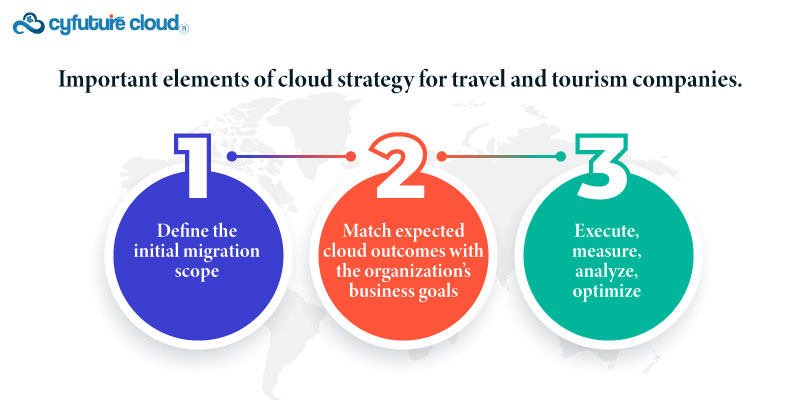Table of Contents
- Introduction:
- Virtual Exploration with Cloud-Powered Tours
- Boost cybersecurity with a cloud-based approach.
- Smart Booking Solutions for Seamless Experiences:
- Enhanced Connectivity for Remote Islands:
- Data-Driven Insights for Sustainable Tourism:
- Real-Time Updates and Emergency Management:
- Personalized Experiences through Cloud-Based Apps:
- How does the travel industry benefit from adopting cloud technology?
- How does the travel public cloud accelerate digital business innovation?
- What is the future of cloud computing in travel?
- Conclusion:
While many ushered in the New Year of 2024 with beach vacations in exotic locales like Mauritius, Maldives, Bermuda, Seychelles, etc., India’s Prime Minister found tranquility in the serene archipelago of Lakshadweep.
During his visit to this Union Territory, Prime Minister Modi not only enjoyed the picturesque surroundings but also emphasized the untapped potential of Lakshadweep, describing it as a region “full of many possibilities”.
After his recent visit and amid the Lakshadweep-Maldives controversy, an Island is being discussed not just in India, but all across the globe. Amid all these happenings the Indian government official announced that several initiatives are underway in Lakshadweep to promote tourism, including the construction of additional accommodation and the development of a large airport.
With this evolving landscape, digital transformation has become essential for the development of the Lashadweep across various sectors, including the tourism industry. In this article, I’ll outline the cloud technology transformation roadmap for the tourism industry of Lakshadweep, providing valuable insights to industry professionals.
Introduction:
According to Globaldata, Cloud computing spending in travel and tourism was worth $8.6 billion in 2021 which is forecast to grow at a CAGR of over 15% between 2021 and 2026.
Tourism industry is looking to harness the cloud in travel applications as an effective means of cost optimization, service diversification, and achieving better business outcomes in a highly competitive market.
Among several modern cloud platforms, Cyfuture Cloud one of the reputable names, offer an array of tools and cloud-based technologies that help companies to build scalable travel platforms, rental management systems, and a variety of other solutions.
Delve into the profound impact of cloud computing on the travel industry through this article. Uncover the myriad business advantages that come with embracing cloud technologies and chart a strategic course for sustained success in the years ahead.
Virtual Exploration with Cloud-Powered Tours
With the advent of cloud-driven virtual tours, the tourist industry is changing dramatically. From the comfort of your home, see the breathtaking landscapes of Lakshadweep, including its coral reefs and sunny beaches, through immersive virtual experiences. Cloud-based virtual tours provide an enthralling sneak peek, encouraging visitors to experience the delights of Lakshadweep firsthand.
Boost cybersecurity with a cloud-based approach.
Implementing a cloud-based cybersecurity defence system based on defense-in-depth technological concepts is the first step towards creating a safe environment. Unauthorised access and data breaches can be successfully prevented by combining state-of-the-art technology, zero-trust principles, and strong defensive layers.
By proactively identifying possible security risks and reducing the risk of vulnerabilities, security is integrated throughout the software delivery lifecycle. In addition to strengthening the travel ecosystem’s general security, this all-inclusive system gives travellers peace of mind that their data is safe from online attacks. This proactive strategy offers a strong defence and comfort to all parties involved in the travel sector.
Smart Booking Solutions for Seamless Experiences:
Cloud-based booking systems improve the booking procedure and provide travellers a smooth travel experience. Cloud technology guarantees quick confirmations, availability, and real-time updates whether booking travel, lodging, or tour packages. This enhances traveller convenience while optimising the effective administration of Lakshadweep’s tourist resources.
Enhanced Connectivity for Remote Islands:
Lakshadweep, which has historically had connection challenges due to its remote location, is overcoming these obstacles thanks to cloud computing. This development guarantees dependable and fast internet access even in outlying areas, improving communication, permitting reservations made online, and facilitating the easy sharing of traveller experiences from Lakshadweep with family and friends.
Data-Driven Insights for Sustainable Tourism:
The tourist officials of Lakshadweep are armed with vital insights derived from data thanks to cloud computing. Making educated decisions for sustainable tourism growth is made possible by cloud analytics, which can be used to analyse resource utilisation trends and identify visitor demographics. This maximises the overall visitor experience while guaranteeing the preservation of Lakshadweep’s fragile ecosystems.
Real-Time Updates and Emergency Management:
For the benefit of both visitors and local authorities, cloud technology is essential in providing real-time updates on weather, transit schedules, and important information. Cloud-based communication solutions provide prompt reactions and coordination in the case of unanticipated incidents or emergencies, therefore safeguarding the safety and welfare of guests.
Personalized Experiences through Cloud-Based Apps:
Tailored for Lakshadweep tourism, cloud-based applications offer personalized recommendations, itineraries, and real-time updates. Leveraging cloud infrastructure, these apps elevate user experiences, ensuring each visit to Lakshadweep is both unique and memorable.
How does the travel industry benefit from adopting cloud technology?

Whether you’re steering a boutique agency with exclusive tours or managing an international travel operation, navigating the nuances of the travel industry is a constant challenge. One shared obstacle is the enduring reliance on outdated, cumbersome on-premises software.
Recognizing this challenge, travel executives understand that failing to keep pace with global technology trends not only jeopardizes their current business but also undermines the potential for future growth and diversification. The remedy to this predicament lies in embracing the broader integration of cloud computing within the travel sector.
The advantages of incorporating cloud hosting services in India are manifold and impactful. Let’s highlight just a few of them:
|
Considerable cost savings |
Transitioning to a cloud infrastructure eliminates the need for substantial upfront investments in servers, network hardware, and specialized software. Instead, companies pay only for what they use, resulting in significant cost savings. |
|
Remarkable scalability |
The cloud empowers travel businesses to swiftly and flexibly scale their operations based on changing demand, ensuring optimal resource use and efficient cost management. |
|
Incomparable flexibility |
Cloud-native systems offer 24/7 global accessibility, enabling seamless remote work for travel professionals. This facilitates efficient collaboration, allowing personnel like travel agents, tour guides, and booking managers to access information effortlessly on their mobile devices. |
|
Centralized data management |
Migrating to the cloud consolidates your data in one central location, streamlining analysis, enhancing forecasting accuracy, and enabling personalized customer experiences based on travel history. |
|
Better customer service |
Cloud hosting in India enhances travel businesses, providing real-time access to current customer information, including preferences, orders, and past interactions, fostering efficiency. |
|
Improved security |
Cloud solutions outshine on-premise systems, providing robust security with advanced features like encryption, multi-factor authentication, and more. |
How does the travel public cloud accelerate digital business innovation?
The global tourism industry has undergone a significant transformation within a mere 10-15 years, relinquishing the majority of physical offices and transitioning almost entirely to online operations. According to recent stats by Research and Markets, online sales in travel are going to reach a whopping $1.8 trillion by the year 2025 and travel cloud innovation will be the key driver of this process.
This resonates with broader trends in cloud adoption, reflecting the increasing number of enterprises venturing into their cloud journey. Let’s delve into some compelling statistics:
- 94% of enterprises use cloud services
- On a daily basis, the typical office worker utilizes 36 cloud services.
- 67% of enterprise infrastructure is now cloud-based
- Almost half of the businesses (48%) store their business-critical data in the cloud
- The cloud computing market is expected to grow at a compound annual growth rate (CAGR) of 16.3% until 2026.
Returning to the theme of adopting cloud technology in the travel sector, a mere lift-and-shift approach, transferring IT systems to cloud platforms, falls short of revolutionizing your business. Cloud computing holds substantial potential for fostering innovation, not just through technology but also by ushering in transformative shifts in overall business strategy.
From the technical standpoint, any travel business that has already transitioned its IT infrastructure to a public cloud has gained a competitive edge. Namely:
- They no longer need to support the expensive, aging on-prem hardware infrastructure or pay hosting providers for dedicated server hosting that are rarely utilized to the fullest
- Integrating with other travel solutions through powerful cloud APIs is now simpler than in the past.
- Modern storage, compute services, and professional cloud development from reputable vendors enhance data processing, real-time predictive analysis, distributed search, content delivery, AI interactions, and more.
- Platform-managed performance, security, and service availability relieve the burden on in-house IT teams.
- Global-scale cloud platforms ensure consistent service performance worldwide, while the rapid and seamless development and deployment of applications characterize the contemporary landscape.
- Cloud hosting India comes with the added benefits of continuous backups, fault-tolerance, and data recovery tools that address data security and integrity issues
What is the future of cloud computing in travel?
As more and more casual and business travelers turn to online channels to plan and book their trips, the demand for cloud hosting India travel solutions will be growing at a steady rate. On top of that, recent breakthrough advancements in AI technology are expected to further enhance the capabilities of travel platforms, leading to even more innovation and efficiency in the industry and more personalized, connected travel experiences for everyone seeking to maximize the travel value per dollar spent.
Because there are many profitable prospects in the travel sector, market players are raising the ante by delivering complete platforms that meet all needs. These platforms not only helps companies cut costs on a large scale, but also provides advanced user experience personalization tools, enables global omnichannel content delivery, and gives travel companies and data storage services. As the industry undergoes continuous evolution, these innovative solutions are positioned to drive its growth and success.
Conclusion:
As Lakshadweep continues to capture the imagination of travelers seeking pristine natural beauty, cloud technology emerges as a catalyst for transforming the tourism experience. From virtual exploration to sustainable practices, the cloud revolution is reshaping how tourists discover and appreciate the wonders of Lakshadweep. The synergy between technology and nature promises a future where paradise is not only preserved but also made more accessible and enchanting for all.
Recent Post
Send this to a friend

 Server
Colocation
Server
Colocation CDN
Network
CDN
Network Linux
Cloud Hosting
Linux
Cloud Hosting Kubernetes
Kubernetes Pricing
Calculator
Pricing
Calculator
 Power
Power
 Utilities
Utilities VMware
Private Cloud
VMware
Private Cloud VMware
on AWS
VMware
on AWS VMware
on Azure
VMware
on Azure Service
Level Agreement
Service
Level Agreement 




















